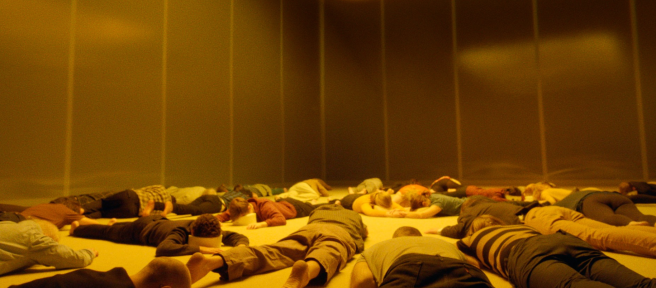Directed by Pella Kågerman, Hugo Lilja

Aniara is like if you took Wall-E, Solaris, Passengers and A Ghost Story and put them in a blender, and then you sprinkled in a little Lars von Trier for good measure. It’s a story that takes place in a hermetically sealed world, a large space ship taking passengers on a three week journey to their new home on Mars and which takes place over the course of many years. That’s because early into their journey a collision with space debris ruins their thrusters and sets them off course. The subsequent plan, their captain tells them, is to wait until they reach a planet whose gravitational pull they can use to slingshot around and return home. He says it’ll take two years, and the passengers are thrown into a small existential crisis which will only grow when those two years turn into much more.
The two years is also a lie, as our main character Mimaroben quickly learns. There is little hope of recovery, and instead the captain hopes to alleviate fears long enough to create a self-sustaining environment, turning the ship into a tiny, strange little planet. Within that setting unfolds a microcosm of life, complete with God-like worship, a subsequent God-like death and then a whole lot of reckoning with inevitable death.
The movie isn’t concerned with plot because the idea of salvation is so remote. If this isn’t clear early on then the first or second time jump to several years later makes it so. The characters, in this case, aren’t active protagonists but rather artifacts that mark time through their wrinkles and eventual body count.
On one hand it’s poetic and beautiful, but within each sequence the movie is rather subjective and even melodramatic. I think this both works for and against the movie. It injects a sense of hope into Mimaroben’s life, a flirtation that turns into something like marriage and a child too, but because of the overwhelming sense of doom that surrounds all of this that same hope feels downright ludicrous. Mimaroben seems like a character too intelligent to give into such things, and her romance felt to me a bit forced and insincere, conveyed through a couple intimate montages rather than through more subtle moments that could explain the depths of their connection.
But that’s the point, right? To show how in the face of such extremely dire conditions we still keep on living. I couldn’t help but think of that same imminent doom when we see the child born, comparing that to our actual world, with global warming a threat only building over time.
But I found that this subjectivity, identifying with Mimaroben’s desires and fears, took me out of the movie for a bit. I prefer to see them within the almost cruelly detached framing of the movie as a whole. And the way this movie is told, in such a small world over large swaths of time, necessarily forces us outside of their world, to look at them like scientists studying lab rats. Their behaviors, whether to give into the existential doom or to try and defy it, should, it seems to me, feel alien no matter what. We’re looking at them through a thick lens, as if studying their patterns.
So when the movie puts us right there with Mimaroben, meant to feel what she feels, it just felt a bit misguided, taking away from the entire experience. And that’s only because it always felt doomed, so the buildup of her romance and family only ever felt like it existed to be pulled away from her in the end.
That doom is so profound that nothing which precedes it carries much weight.
So it’s all about framing here. The general concept as well as the physical environment and sense of time forces us to stand outside of the humans, to look at them as though they were another species, to gleam some kind of truth from their existence through the parable-like story. But then in the middle we’re shoved right in the middle, as if we’re living amongst them. This section is the more conventional style of framing, but it felt out of place in a movie like this. Outside of maybe Vantage Point this is the only film whose shifting point of view gave me whiplash. And yet the imagery, world design and existential doom resonates enough that I kept thinking about it as I drifted off to sleep.
Up Next: The Dead Don’t Die (2019), A Separation (2011), The Handmaiden (2016)

whoah this blog is great i really like reading your posts.
Keep up the great work! You understand, lots of people are
looking round for this info, you could help them greatly.
LikeLike
That’s really kind of you to say! I’ll keep chugging along.
LikeLike